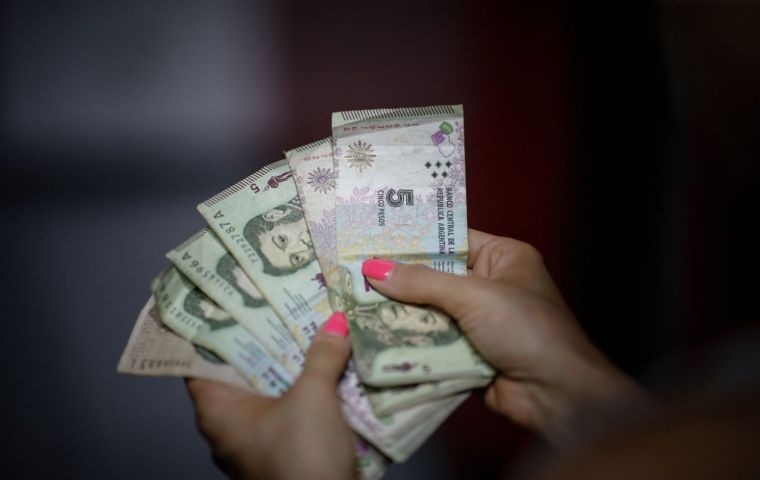MercoPress. South Atlantic News Agency
Argentina loves the dollar and has total aversion for its own currency
 “You can’t de-dollarize the mentality of a nation simply by cutting its access to dollars,” said liberal economist Javier Milei
“You can’t de-dollarize the mentality of a nation simply by cutting its access to dollars,” said liberal economist Javier Milei Argentina’s battle to control its currency is upending South America’s second-largest economy, wreaking havoc on everything from household finances to the production and sale of common goods.
Measures including taxes on greenback purchases and demands that some companies restructure their dollar-denominated debts have misfired, propelling the gap between the official and the black market exchange rates to the widest since 1989 while failing to boost international reserves.
Some analysts warn a large devaluation may be on the horizon despite President Alberto Fernandez’s public opposition to the idea and Finance minister Martin Guzmán repeatedly denying any chance.
Controls on the peso and increased money printing are adding to the coronavirus pandemic and amplifying existing economic problems such as a three-year recession one of Latin America’s fastest inflation rates, all while stirring memories of past crises.
In effect Argentina has cyclical bouts of recession and in 2001/02 the economy simply melted, and again from 2010 to 2018 fell into stagflation once the commodities prices rush was over. No wonder then that Argentines take to the greenback as refuge against an ever declining currency
“You can’t de-dollarize the mentality of a nation simply by cutting its access to dollars,” said liberal economist Javier Milei who insisted the only way to convince agents to think in peso terms is to have policies that make the currency credible, stable, but Argentine governments for years have missed the target
In effect the widening gap between the official and the parallel exchange rates, over 125%, is stoking consumer fears that a large devaluation is coming. Meanwhile, annual inflation running near 40% adds to the sensation that the local currency is losing value fast.
As a result, many common Argentines rush to unload their pesos at all cost. “Nobody wants pesos, so clients don’t care anymore about the prices. They just buy,” said Pablo Gaytan, co-owner of Corralon Ciudadela, a local business in the province of Buenos Aires that sells construction materials. A shortage of supplies amid a strict coronavirus lockdown has also added to the uncertainty, he said.
While it’s been standard practice to sell Argentine properties in U.S. dollars, some owners have started to price rents in greenbacks, too. Still, the lack of trust in the direction of the peso makes it difficult to determine future housing costs, especially as capital controls force Argentines to use the black market to buy the dollars or agree to pay in pesos based on the informal currency rate.




Top Comments
Disclaimer & comment rules-

-

Read all commentsWho can blame them? Given the price of toilet paper they'd be well advised to use pesos, it's cheaper...
Oct 25th, 2020 - 08:44 am 0What normal person would not dislike a bill with the face of Eva Duarte Petacci, wife of General Juan Domingo Mussolini?
Oct 26th, 2020 - 04:45 pm 0Commenting for this story is now closed.
If you have a Facebook account, become a fan and comment on our Facebook Page!